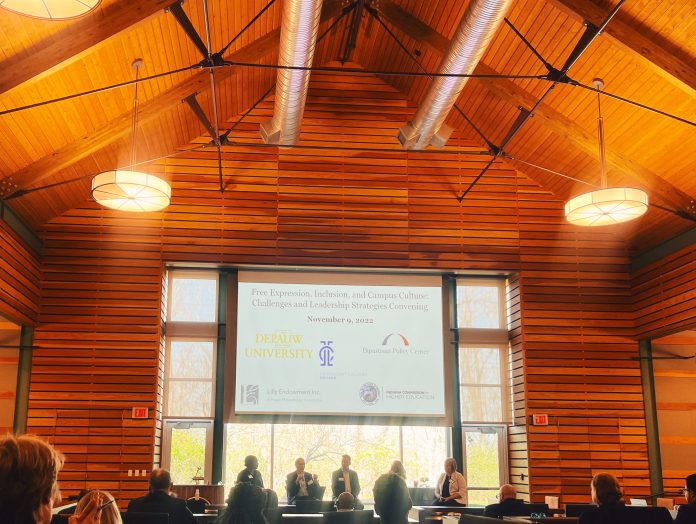
On Nov. 8 and 9, DePauw University hosted a Freedom of Expression Convention for colleges across the state of Indiana. College presidents, campus leaders in academic affairs, and staff members who specifically work in academic freedom gathered at the DePauw Prindle Institute for Ethics for a two-day conference on Wednesday and Thursday. This convening was made possible by the Lilly Endowment and was co-sponsored by the Independent Colleges of Indiana, the Indiana Commission for Higher Education, and the Bipartisan Policy Center.
On Wednesday afternoon, campus leaders discussed campus free expression. This panel consisted of a diverse make-up of universities ranging from big state schools such as Indiana University and Purdue University to small liberal arts colleges such as St. Mary’s College and DePauw University.
The diversity among the schools on the panel allowed the discussion to focus on the differences between each institution. Although each university has the same goal, what they provide to get to that goal may look different depending on why students are driven to their university.
Megan Halteman Zwart, an associate professor at Saint Mary’s College, emphasizes the six topics St. Mary's College promotes in their St. Mary's College experience.
“Attention, Empathy, Curiosity, Humility, Courage, and Intellectual responsibility,” she said while on the panel.
According to Zwart, each of these values teaches students to express themselves and their beliefs. St Mary's College also has a first-year program called Dialogue and Discovery. In this class, students will express their opinions through discussion-based classes on a variety of topics. Zwart states that the objective is to “plant seeds for the future.”
Due to St. Mary's relatively small size of 1,400 students, each student can receive personalized attention from the university and truly take something out of the Dialogue and Discovery program. On the contrary, a school like Purdue with 41,000 students doesn’t have the ability to closely interact with each individual student.
Pat Kain, an associate professor of philosophy at Purdue University, discussed the topic of Indiana nice. “There is Indiana nice, a cultural thing,” Kain said. “A con is that people avoid controversy, which makes getting students to engage in controversy difficult.” Kain emphasizes how a shift in culture on Purdue's campus can change the way that students practice free expression.
Although there are many different ways to practice freedom of expression on college campuses, each panelist was promoting the same idea.
The panel's goal is to promote the ability for students to feel comfortable expressing themselves and acknowledging each other's differences.
“I wanted to provide my students with a toolbox. To develop the skills that aren't there yet, is a challenge,” Kain said and added that moving forward, “we need to build a better culture of listening.”
Each institution expressed a desire to provide its students with the resources to practice freedom of expression.
Dionne Jackson, DePauw’s vice president for Institutional Equity, attended this week's event and gathered many ideas to bring back to campus.
“Engaging with higher education leaders during the Free Expression, Inclusion, and Campus Culture Convening really emphasized for me the importance of understanding what free expression is and how to use effective strategies to build a community of trust,” Jackson said. “Continuing on our path of educating our campus community and building this trust is what I would recommend as continued key next steps for DePauw.”
Jackson’s mission at DePauw is to take on a leadership role while helping DePauw become a more inclusive and equitable community. “As vice president for Institutional Equity, I work each day to ensure all aspects of the student, employee, and alumni experience are fully aligned with our DePauw values of diversity, equity, and inclusion,” Jackson said.
The Freedom of Expression Convention connected with Dr. Jackson and her role for DePauw. In particular, the freedom of expression goals corresponds with the Diversity, Equality, and Inclusion program here at DePauw.
“During the convening, I had the opportunity to facilitate a conversation of senior diversity officers representing institutions throughout Indiana. We discussed many ways in which free expression intersects with diversity, equity, and inclusion (DEI) on our campuses. For example, free expression promotes and impacts belonging, and civility in free expression can foster understanding of diverse views, while developing skills in understanding how to disagree,” Jackson said. “As senior diversity officers, we all agreed that we also have to effectively model the connections of DEI and free expression as we lead our DEI efforts on campus.”
This convention allowed administrators and professors to share what worked for them at their schools while also listening and learning from other schools. With this information, universities across the state of Indiana will have a new understanding of what freedom of expression means. Moving forward, these universities will have the opportunity to provide their students with the resources they need to succeed.
